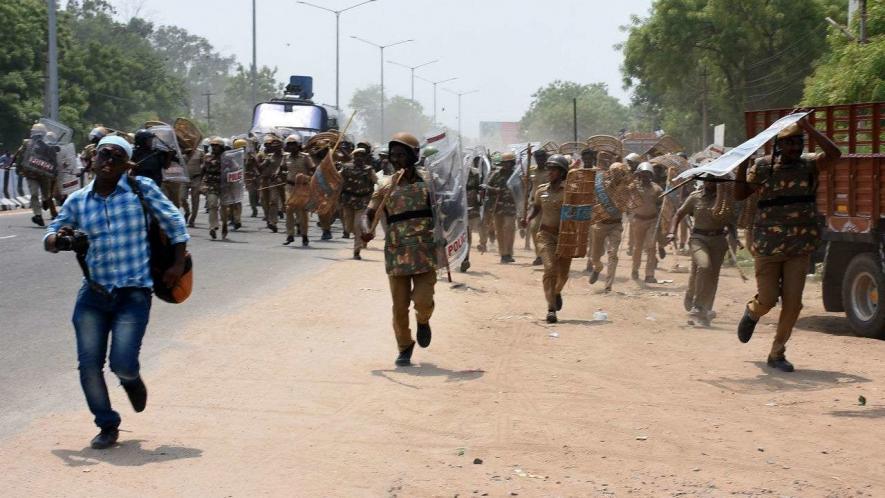Madras HC: “How Brazen and Insensitive Can the State be?”

The Madurai Bench of the High Court of Madras has passed an Order partly allowing two Writ Petitions which challenge the police action following the anti-Sterlite protests in Thoothukudi. The Division Bench comprising Justices CT Selvam and AM Basheer Ahmed declined to declare the First Information Reports (FIR) filed as null and void, but allowed them to be treated as statements made to the police under section 161(3) of the Code of Criminal Procedure (CrPC).
Read More: What Actually Happened in Thoothukudi
One petition was filed by A John Vincent and the second by D Ponpandi. Both petitions had prayed that the multiple FIRs filed against the protesters should be declared null and void. They also prayed that these FIRs should be treated as statements made to a police officer under section 161(3) of the CrPC. Since the relief sought in both petitions was the same, the Bench passed a single Order for both cases.
Section 161(3) of the CrPC deals with statements made to the police by a witness. The implication under this section is that an FIR has already been registered and that the person making statements is only aiding the investigation.
Read More: Tuticorin Struggle: Madras HC Advocate Defending Jailed Protesters Arrested, Activists Cry Foul
On May 22 this year, discontentment had reached new heights in Thoothukudi – also known as Tuticorin – in Tamil Nadu. A subsidiary of the infamous Vedanta, Sterlite was set to expand its polluting copper smelting plant. Protests against the expansion had been mounting since February. On that day, the people of Kumarediapuram, Therku Veerapandiayapuram, Pandarampatti, Meelavittan, Madathur, Matha kovil area, Mattakadai, Terespuram New Street, Fathima Nagar, and Lions Town areas assembled to protest against the Sterlite plant.
Read More: Thousands Unite Against Vedanta’s Sterlite Copper Plant In TN’s Thoothukudi
The plant had been established in 1996. However, in 2010, the Madras High Court had ordered its closure as it had violated environmental laws. In 2013, the Supreme Court allowed the plant to resume its activities after imposing a Rs. 100 crore-fine for polluting the environment. Due to the effluents from the plant, the people living around it have suffered from asthma, pharyngitis, sinusitis and other respiratory tract infections which occur due to toxic gases in the lower atmosphere. In addition, there have been an unusually large number of menstrual disorders like menorrhagia and dysmenorrhea occurring in the area.
Read More: Tamil Nadu Simmering After 13 Deaths, Anti-Sterlite Protesters Recount Horror of Police Crackdown
What initially was intended to be a peaceful protest against the plant's expansion turned into a textbook example of police brutality when the police opened fire on the unarmed protesters. The protesters alleged that the police had designated sharp-shooters to target 'trouble makers', no doubt a euphemism for activists.
Read More: 11 Die in Police Fire on Protesters Against Vedanta Subsidiary in India
Following the shooting, a media storm erupted. Opponents of the government in Tamil Nadu were barred from entering the area, ostensibly because it would violate the proclamation under section 144 of the CrPC. Self-anointed 'godman' and consumer goods mogul, Baba Ramdev, however, voiced support for Vedanta, terming the protests as an 'international conspiracy'. The Tamil Nadu government fearing a further backlash from the people finally relented and ordered that the plant be shut down on May 28.
Read More: Baba Ramdev Backs Sterlite, Says Sterlite Protests were Instigated by ‘Foreign Conspirators’
However, the story had not ended. According to the petitioners, the police had registered multiple FIRs against those involved. One person was named in 100 FIRs and another in 85. All the sections under which the FIRs were filed would result in the accused's arrest. This means that if they were able to secure bail in connection with one FIR, they could still be arrested under another.
Read More: Cutting Across Political Lines: Why the Modi Govt. Will Try to Forget the Tuticorin Firing
According to the Order, the counsels for the respondent state did not deny that a particular individual was implicated in multiple FIRs. Instead, they sought to justify this phenomenon by citing numerous events ranging from damaging public and private property to arson.
The response of the Bench to the respondents’ weak justification can be best summed up in paragraph 13 of the Order:
“A hundred F.I.Rs, eighty five F.I.Rs against particular individuals? Is one to obtain bail in one case only to be told that he is detained in another? Is this a message to the protestors of Thoothukudi - 'Don't you dare'? How brazen and insensitive can the State be? Is the State oblivious or uncaring of the position that by conducting itself in the manner informed, it is putting every person, even if he has played an ever so small part in the protests in fear of the midnight knock and arrest? Are family members, who have lost their near and dear ones, constantly to fear their arrest or that of their loved ones? Is the State being oblivious or is it the intent? Given the sadness of the Thoothukudi incident of 22.05.2018 why is the State, when it should be looking for the balm that heals, be raising the police palm that threatens?”
The Bench disposed of the petitions without cost and allowed them, if need be, to approach the Principal Benc
Get the latest reports & analysis with people's perspective on Protests, movements & deep analytical videos, discussions of the current affairs in your Telegram app. Subscribe to NewsClick's Telegram channel & get Real-Time updates on stories, as they get published on our website.
























